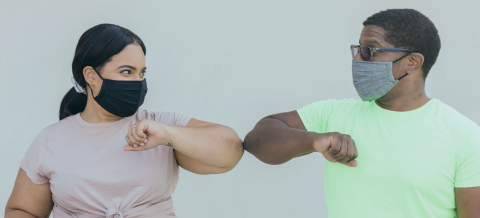Coping with Differing Opinions on COVID-19 Safety
As COVID continues, so does our exposure to misinformation and varying opinions on the virus, even within our own families. Differing opinions among family members and friends can cause added stress and anxiety on top of the everyday stressors of the pandemic.
It can be difficult to talk to someone who doesn’t believe COVID is serious and refuses to wear a mask or maintain physical distance. Here are some ideas on how to effectively talk to people in your life about your choices, your safety, and the importance of maintaining healthy habits:
Talk about yourself, not them.
If you tell someone they’re doing something wrong, they’re going to get defensive and the conversation goes nowhere. Instead, use “I” statements. So, instead of saying things like “You need to stop going out without a mask,” try to use statements like “I get really worried when I see you talking to people without your mask on.”
Keep it personal!
Make wearing a mask or social distancing persona. For example, saying “I wear a mask or social distance because I’m concerned about my grandmother who is at higher risk,” will make a stronger impact than only sharing the science around the effectiveness of wearing masks.
Get curious.
People are more likely to pay attention to those who listen to them. Ask questions and then actively listen. Try: “Tell me more about why dining indoors at restaurants is important to you?” Questions like these can help you understand what the motivations are and have a deeper, more productive conversation.
Use your voice.
If things start getting tense, use a lower soothing voice to bring everyone back to a calmer place. Higher tones signal excitement or stress so try bringing your voice to a gentle, even, deeper tone. Think about the radio announcer’s voice on a late-night radio show and shoot for that pacing and tone. The body tends to mimic the energy of others so even if you aren’t talking, you can help bring everyone to a more relaxed state by just doing some slow, deep, even breaths for yourself.
Find common ground.
Try to relate to their concerns by stating how frustrated you are by this virus and how it has affected everyone’s lives. That can open the way for a productive conversation about how we can slow the spread in our community.
Stick to your decisions.
We often feel pressured to succumb to the desires of others, particularly when it comes to our family. Staying healthy and safe should be your top priority.
Take space when needed.
Sometimes the disagreements between family members over COVID or even politics can be too much. It’s okay to take a step back to de-escalate a situation and focus on yourself. Go for a walk, connect with a family member or friend who understands your point of view. Take whatever time you need. We have all been affected by COVID in some way, and we are each responding to it differently. Remember that how you choose to stay safe is ultimately your decision and does not have to be up for debate.
